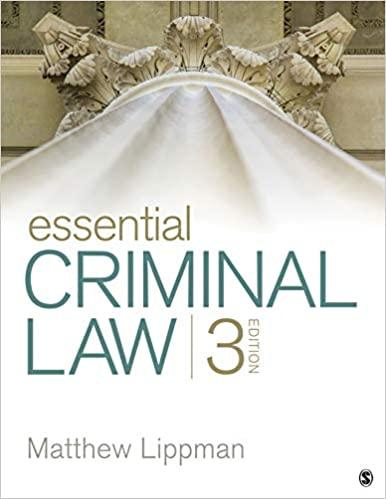Question
Bi-Economy Market, Inc. v. Harleysville. Ins. Co. of New York Review both the arguments of Bi-Economy Market and Harleysvill Ins. Co. Acting as the Judge,
Bi-Economy Market, Inc. v. Harleysville. Ins. Co. of New York
Review both the arguments of Bi-Economy Market and Harleysvill Ins. Co. Acting as the Judge, how would you rule? Why? Be prepared to support your legal position to your classmates.
Facts: Bi-Economy Market was a family-owned meat market in Rochester, New York. The company was insured by Harleysville Insurance. The "Deluxe Business Owner's" policy provided replacement cost for dam- age to buildings and inventory. Coverage also included "business interruption insurance" for one year, meaning the loss of pretax profit plus normal operating expenses, including payroll. The company suffered a disastrous fire, which destroyed its building and all inventory. Bi-Economy immediately filed a claim with Harleysville, but the insurer responded slowly. Harleysville eventually offered a settlement of $163,000. A year later, an arbitrator awarded the Market $407,000. During that year, Harleysville paid for seven months of lost income but declined to pay more. The company never recovered or reopened. Bi-Economy sued, claiming that Harleysville's slow, inadequate payments destroyed the company. The company also sought consequential damages for the permanent destruction of its business. Harleysville claimed that it was responsible only for damages specified in the contract: the building, inventory, and lost income. The trial court granted summary judgment for Harleysville. The appellate court affirmed, claiming that when they entered into the contract, the parties did not contemplate damages for termination of the business. Bi-Economy appealed to the state's highest court.
You Be the Judge: Is Bi-Economy entitled to consequential damages for the destruction of its business?
Argument for Bi-Economy: Bi-Economy is a small, family business. We paid for business interruption insurance for an obvious reason: In the event of a disaster, we lacked the resources to keep going while buildings were constructed and inventory purchased. We knew that in such a calamity, we would need prompt reimbursementcompensation covering the immediate damage and our ongoing lost income. Why else would we pay the premiums? At the time we entered into the contract, Harleysville could easily foresee that if it responded slowly, with insufficient payments, we could not survive. They knew that is what we wanted to avoidand it is just what happened. The insurer's bad faith offer of a low figure, and its payment of only seven months' lost income, ruined a fine family business. When the insurance company agreed to business interruption coverage, it was declaring that it would act fast and fairly to sustain a small firm in crisis. The insurer should now pay for the full harm it has wrought.
Argument for Harleysville: We contracted to insure the Market for three losses: its building, inventory, and lost income. After the fire, we performed a reasonable, careful evaluation and made an offer we considered fair. An arbitrator later awarded Bi-Economy additional money, which we paid. However, it is absurd to suggest that in addition to that, we are liable for an open-ended commitment for permanent destruction of the business. Consequential damages are appropriate in cases where a plaintiff suffers a loss that was not covered in the contract. In this case, though, the parties bargained over exactly what Harleysville would pay in the event of a major fire. If the insurer has underpaid for lost income, let the court award a fair sum. However, the parties never contemplated an additional, enormous payment for cessation of the business. There is almost no limit as to what that obligation could be. If Bi-Economy was concerned that a fire might put the company permanently out of business, it should have said so at the time of negotiating for insurance. The premium would have been dramatically higher. Neither Bi-Economy nor Harleysville ever imagined such an open-ended insurance obligation, and the insurer should not pay an extra cent.
Step by Step Solution
There are 3 Steps involved in it
Step: 1

Get Instant Access to Expert-Tailored Solutions
See step-by-step solutions with expert insights and AI powered tools for academic success
Step: 2

Step: 3

Ace Your Homework with AI
Get the answers you need in no time with our AI-driven, step-by-step assistance
Get Started


